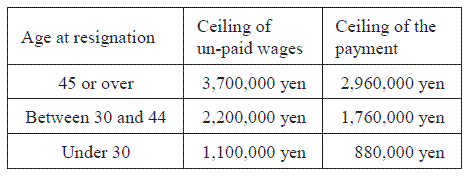|
1. Principles of Payment of Wages
2. Guarantee of Wages and Minimum Wages
3. Decreases in wages as sanctions
4. If companies go bankrupt and the wages haven’t been paid
5. Annual Salary System
1. Principles of Payment of Wages
In the Labor Standards Act ',wage' means
the wage, salary, allowance, bonus and every other payment to the employee
from the employer as remuneration for labor, regardless of the name by
which such payment may be called. (Article 11)
When drawing up a labor contract, the employer must state clearly matters concerning wages and hand a statement to the employee. (Article 15)
The Act also stipulates the principles of payment of wages in order to ensure that the wages are handed to the employees as follows; (Article 24)
a. Wages must be paid in cash (Japanese Yen) except in cases provided for by Act or ordinance, or by union agreement.
b. Wages must be paid directly to the employees themselves
c. Wages must be paid in full. Partial deduction may not be permitted with the exception of taxes, social insurance premiums and others according to the written agreement.
d. Wages must be paid at least once a month on a definite date, except
extraordinary wages such as a bonus, etc.
2. Guarantee of Wages and Minimum Wages
As wages are the most important matter for
employees' life, the Labor Standards Act stipulates guaranteed payment
as follows;
a. In the event of suspension of business for reasons attributable to the employer, the employer should pay an allowance equal to at least 60 % of the employee's average wage. (Article 26)
b. With respect to employees employed under a piece-work system or other sub-contracting system, the employer should guarantee wages at a fixed amount proportionate to hours of work. (Article 27)
c. In the event an employee requests the payment of wages to cover emergency expenses for illness, accident or other emergency cases, the employer should pay accrued wages prior to the normal date for payment. (Article 25)
d. The employer cannot hire an employee for less than the minimum wage, stipulated by the Minimum Wages Act. (Article 28)
[New Point]
The minimum wage was changed.
The minimum wage in Tokyo is ¥791 per hour as of Oct.1, 2009
In addition to this, minimum wages are given in each industry.
e. Claims for wages, accident compensation and other claims will lapse if not made within two years; and claims for retirement allowances will lapse if not made within five years. (Article 115)
3. Decreases in wages as sanctions
[Employer Point]
A company may" decrease wages as a sanction"
in order to maintain discipline at the firm. This is different from deducting
wages which amount is according to the hours of lateness or absence. The
company should state the details about decreases as sanctions in the rules
of employment.
In the event the rules of employment provide for a decrease in wages as a sanction against an employee, the decrease for:
a. a single deduction shall not exceed 50% of the daily average wage and
b. the total amount of decrease shall not exceed 10% of the total wages for a single pay period. (Article 91, Labor Standards Act)
4. If companies go bankrupt and the wages haven’t been paid
In an event that a company goes bankrupt and it fails to pay its employees, there is the system in which the government advances the employees' wages on behalf of the company. This is based on the Security of Wage Payment Act “( CHINKAKU - HO”).
(1) Person eligible to receive Replacement Payment
a. When a company which has been engaged in business activities for a year or more goes bankrupt, and the employee has been laid off from the company, without being paid. This system does not apply when the total of unpaid wages is less than ¥20,000.
b. Employees who have retired from the company on a day within a period from six months before the bankruptcy to two years thereafter as counted from the day when the bankruptcy was filed with the court (in the case of "Bankruptcy in Act" ), or the day for application as a bankruptcy in fact to the Labor Standards Inspection Office (in the case of “Bankruptcy in Fact”).
"De facto bankruptcy" is only applicable to small and medium-sized companies, wherein the Labor Standards Inspection Office recognizes that a business has become defunct with no chance of reestablishment and is unable to pay wages, even though bankruptcy has not yet been filed.
This is limited to small and medium sized companies only.
(2) Unpaid Wages subject to Replacement Payment
a. Subject to replacement payment is the unpaid sum of the regular wages and the retirement allowance which should be paid during the period from the date 6 months before the resignation to the day before the claim date. Extraordinary wages or discharge notice allowances shall not be subject to the payment.
b. The limit of replacement payment is the amount of 80% of the unpaid wages and the ceiling is shown in the following table:

Please contact the Labor Standards Inspection
Office on procedures regarding payments made on behalf of failed companies.
5. Annual Salary System
The annual salary system is the pay system
in which a company decides the annual lump payment of its employee(s) by
evaluating as a whole the ability, work achievements, potential, and so
on, of the subject employee.
[Employer Point]
Companies are also to pay overtime pay to
employees in this system. Even if a given amount of overtime pay is already
included in an annual salary, unless the breakdown of that salary is stated
(e.g.: Annual Salary of XX yen; Extra Pay of XX yen, etc.), employers are
obliged to remunerate overtime work separately. Also, if a worker has worked
more hours than pre-designated, the employer must compensate the difference.
|